#Trauma Tw
Note
everyone saying keep your trauma to yourself because it'll attract the wrong kinds of people can fuck off. "if you can't handle me at my worst, you don't deserve me at my best." I hate walking on eggshells and I casually mention my diagnoses, etc.
I mean, don't sit there and trauma dump obviously but if it comes up, yeah. Is what it is. This is part of who I am.
As someone who is disabled and has schizophrenia, if they're gunna be in your life at all - even as a friend - that's gunna impact it. It's gunna come up.
I don't think it's something you HAVE to disclose if you don't want to, but if you want to mention it and they can't handle it, they can't handle who you are and that's their loss, bye Felicia.
I can see how Tinder specifically (as opposed to like Okcupid, Bumble, Hinge, whatever) might be problematic for attracting what you want if you're looking for a relationship, not just a hookup. But like, you gotta use what works for you and is popular enough in your area to have people on there.
I actually agree that I should be very careful with what trauma I disclose and when and how, but this idea that I should and could easily just avoid sharing the fact that I'm disabled/on disability benefits/in a group home WITH A PERSON I'M DATING is plain ridiculous to me
26 notes
·
View notes
Text
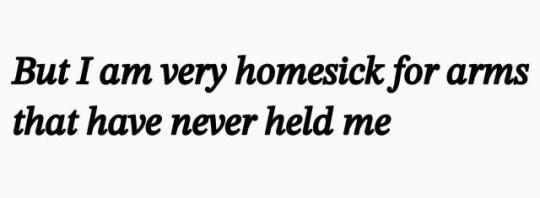


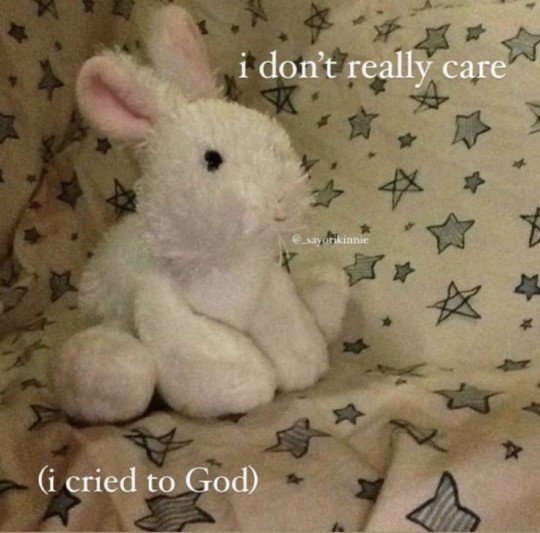
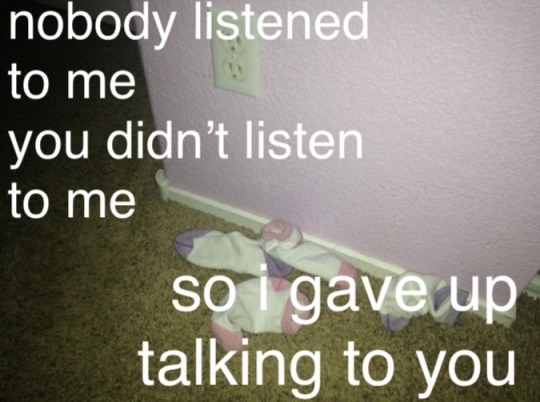

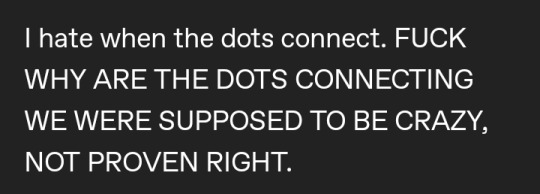


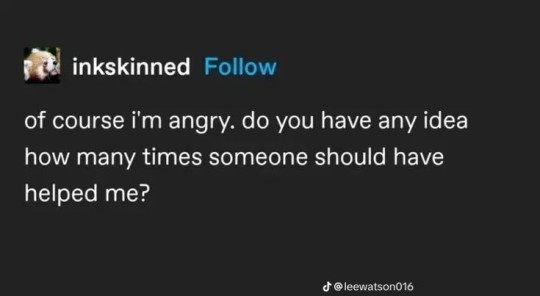
I didn't realize your reasons and I didn't know your plans, until I became the same age you were back then and it horrifies me. I wish you had done more so I could prove the world I am right, and I wish you had done nothing to me at all. Isn't it weird how it works?
#web weaving#web weave#webweaving#on grief#childhood grief#trauma tw#child abuse tw#maybe(?)#grooming tw#abuse tw#its so funny how i was punished for being naive and he wasnt punished for being a fucking creep
2K notes
·
View notes
Text
Even though the hallucinations and delusions psychotic people experience aren't objectively real, they are often experienced as if they were real, and they can easily be just as scary and traumatizing as any "real" traumatic experience
1K notes
·
View notes
Text
HEROIC INTERVENTION. ( A PROMPT LIST! )
so i was writing this headcanon for one of my characters, and it got me thinking about how some characters are absolutely, to their very core, protectors, and even then they still need protecting! so i made this list which is similar to about five other memes i've made. feel free to add a "reverse" if you so wish! DO NOT ADD TO THIS LIST NOR CLAIM IT AS YOUR OWN. THANK YOU.
FROM THE SENDER TO THE THREAT:
[ TO THE THREAT ]: " is there a problem over here? "
[ TO THE THREAT ]: " can i help you with something? "
[ TO THE THREAT ]: " i think it's time you were leaving. "
[ TO THE THREAT ]: " why don't you and i go outside for a sec? "
[ TO THE THREAT ]: " you wanna tell me why you're hassling my friend? "
[ TO THE THREAT ]: " you better start running before i really get pissed. "
[ TO THE THREAT ]: " i'm sure there's a rational explanation behind you upsetting this person? "
[ TO THE THREAT ]: " i hope you're not thinking of staying here a moment longer. "
[ TO THE THREAT ]: " get out. "
[ TO THE THREAT ]: " right, either you leave or i kick you out. your choice. "
[ TO THE THREAT ]: " i think it's fairly obvious my friend doesn't want anything to do with you, don't you? "
[ TO THE THREAT ]: " leave them alone. now. "
[ TO THE THREAT ]: " didn't you hear them? back off! "
[ TO THE THREAT ]: " don't even think of pretending you didn't hear me the first time: leave! "
FROM THE SENDER TO THE RECEIVER:
[ TO THE RECEIVER ]: " hey, are you okay? "
[ TO THE RECEIVER ]: " don't worry. i'll take care of this. "
[ TO THE RECEIVER ]: " why don't you go on out back? i got this, it's okay. "
[ TO THE RECEIVER ]: " here. you go on into the car, alright? i'm right behind you. "
[ TO THE RECEIVER ]: " is this person bothering you? "
[ TO THE RECEIVER ]: " it's okay. hey, hey… look at me. they're gone. "
[ TO THE RECEIVER ]: " hey… what's going on? what's wrong? i… has this person said something to you? "
[ TO THE RECEIVER ]: " it's alright. the others just went out to the car; why don't you join them? i'll handle this. "
[ TO THE RECEIVER ]: " hey, hey… talk to me, huh? what's the matter? you look like you've seen a ghost… who was that? "
[ TO THE RECEIVER ]: " don't be scared. i'm going to take care of this. i promise. "
[ TO THE RECEIVER ]: " you don't need to say anything. just nod if you want me to kick them out, okay? "
[ TO THE RECEIVER ]: " you're alright. i'm right here, don't worry. and they'll be gone before you can blink, that's another promise. "
ACTIONS:
[ HAND ]: sender, having seen the receiver's encounter with the threat, gently takes the receiver's hand to assure them they aren't alone.
[ INTERVENE ]: sender wordlessly steps in between the receiver and the threat, facing the threat while shielding the receiver from them.
[ BLOCK ]: sender steps in between the receiver and the threat, this time facing the receiver while turning their back to the threat and blocking them from the receiver's line of sight.
[ BACK ]: sender places a protective and gentle hand on the receiver's back, preparing to guide them away from the threat.
[ DOOR ]: sender firmly but politely insists that the threat leave the building, and escorts them out of the door.
[ EXIT ]: sender physically catches hold of the threat and drags them away from the receiver, and outside of the building.
[ PUSH ]: sender places a careful hand on the threat to keep them at arm's length, and steps forward again to give the receiver more space between them and the threat.
[ SHOVE ]: sender runs over and forcefully shoves the threat back and away from the receiver.
[ SPACE ]: sender pushes between the receiver and the threat and begins to move forward, invading the threat's personal space as both a means of intimidation and a way of getting them away from the receiver.
[ DIVERT ]: sender arrives behind the threat and gains their attention, distracting them from the receiver so as to give them time to leave the area.
[ CLEAR ]: the sender firmly and clearly tells the threat that they are no longer allowed in the premises nor anywhere near the receiver.
[ ARM ]: sender wraps a protective arm around the receiver and guides them away from the threat and out of the premises.
[ PUNCH ]: the sender, having seen the receiver's reaction to the threat and the threat's lack of consideration, moves forward and punches the threat in the face.
#rp meme#rp starters#rp memes#rp prompt#protective prompts#rp prompts#writing prompts#writing prompt#roleplay memes#roleplay prompt#roleplay prompts#roleplay meme#roleplay starters#sentence starters#trauma tw#violence tw
1K notes
·
View notes
Text
Ask I got on my sideblog but am answering here:
Hi there! I know you're a therapist and I have a question: I saw some people arguing on Twitter about the impacts of trauma. There was a therapist among them, and they had a masters degree in social work, they post about it often. They say that people who have experienced trauma hurt other people because it benefits them or gives them pleasure, and they are disconnected from empathy and sympathy. That seems wrong, but maybe it's not? That's all, thanks!
Ooof, yeah, that's... complicated. It's technically true, but also frequently used as a lie.
Trigger warning: Child abuse, child grooming, interpersonal violence, trauma (childhood & intergenerational), true crime, totalitarianism
Because basically, that describes MOST humans who decide to hurt other humans on purpose without a strong ulterior motive. That's not a trauma thing, that's a human thing.
I babysit for a family with a 1-year-old and a 3-year-old. When the 1yo does something to upset their older sibling, and that sibling winds up and smacks them, that's the same basic thing. It benefits them (makes 1yo go away), brings them pleasure (having an outlet for their anger is very satisfying), and they're disconnected from empathy (they're often surprised and confused when the 1yo is crying, because they're 3 and THEY feel fine and they don't really understand yet that other people's feelings really exist) or even sympathy (understanding that if you hit someone, they will probably be upset). That's something we adults have to watch out for and intervene in, because empathy and impulse control take time to learn.
But as for where trauma figures into this... how to explain.
There's this old logical puzzle about categories, where you say things like:
All dogs have four legs*
A dog is an animal
And then the catch is that you can't extend that to say
All animals have four legs
*RIP to all the tripods and legless animals that apparently aren't dogs anymore for the purposes of this logic exercise
Animals obviously include fish and millipedes and whales and snakes and jellyfish. The number of legs an animal can have is HIGHLY diverse, and will eventually lead to a debate on what the definition of "leg" is.
So there is this common thing we see:
Some people are much more violent and aggressive than other people
These violent and aggressive people have almost always experienced some form of trauma/abuse/neglect
And the link people are really prone to thinking is:
People who have experienced trauma/abuse/neglect will go on to being violent and aggressive with other people.
This is incorrect. To some degree, I can see why it's widely believed - after all, way more people tune in to learn about a serial killer's abusive childhood than for the more common story, which is survivors of trauma slowly going about their lives in ordinary undramatic ways.
Because the thing is, trauma is REALLY diverse. Humans are inherently varied and a bit chaotic, since we can choose very different ways to live and operate, and trauma splits that variability like a prism turning light into a rainbow. Only about 30% of abused children grow up to be abusive themselves. The other 70% choose very different lives.
And yet. My eternal question is: WHY is this such a meme? Why do so many people with a shitty childhood flinch at the 30% statistic and think, "Is that me? Am I destined to be a monster?" Why does this story have legs, when so many other facts about trauma have way more empirical backing and usefulness and get very little attention?
I submit that there is one group that fucking LOVES the idea that traumatized person equals abuser. One group that pushes it into the discourse, in international media or around the family kitchen table, with great ingenuity and gusto.
Abusers.
They love it for two reasons. The most obvious reason is: It absolves them of their actions. "It wasn't ME who hit you, it was my childhood trauma!" A veritable classic excuse that takes their agency out of the equation. And it really can be hard to tell when it's a good excuse and when it isn't!
Reason two is the more insidious one: It cuts their victim's sense of goodness, worthiness, and moral certainty out from under them.
It's as simple as saying, "Look at how you pushed back at me (when I was abusing you)! You're the REAL abuser here!" It's the heart of what domestic abuse researchers call DARVO (Deny, Attack, Reverse Victim and Offender). It can be that simple, or it can be so complicated and byzantine it makes your head hurt.
I only really got a handle on understanding this thanks to a friend, who said she was okay with me sharing this story if I didn't identify her. I won't go into any unrelated details of her abuse, but for the record, hers is probably the most extreme case of anyone I've personally interacted with, and I used to work as a therapist and in domestic violence shelters. Her dad heinously abused her as a child. He'd also studied psychology in university. I have been trying to fathom how the fuck anyone could do what he did to her for YEARS, and I think I've got a few viabletheories.
So. She was an ordinary child, bright, warmhearted, well-behaved, and a bit autistic. A bit more naive and trusting than your average preschooler. I imagine that from his perspective, there was the convenient benefit that he often had unrestricted access to her, and he could relatively easily overpower and manipulate her.
But she had one serious downside: If anyone ever found out what he was doing to her, they would go fucking apeshit. She wasn't really prone to lying or acting out, so people would treat her as a fairly credible reporter; several other adults found her she was lovable, innocent, and endearing; and what he wanted to do to her was, I repeat, heinous.
So while he abused her, one of the things he said was: "I'm doing this because I was abused as a child. That's how it works. All abusers come from abuse. There are statistics proving it. This means you're an abuser too. See what society thinks about child abusers? That's what people will think about you, if they know that you've been abused."
And she was, you know, a child, not someone who studied psych research. He was her dad. So she believed him.
She thought that he was using his adult brain to correctly assess the truth about her as a person, for purely objective reasons. The way you'd try to teach a kid who talks with their mouth full about table manners. It's been a couple decades now, but she is still very slowly chipping away at her core belief that she is inherently awful and only her father recognized the truth about her.
Sometimes when we talk about it I have to bite my tongue because I'm sitting here trying to figure out what the fuck was going on with him, an adult man who wanted to abuse her because he'd really enjoy it. I think about him trying to figure out how to manipulate an innocent child into accepting being abused, and minimize the risk that he'd go to jail for it. And although I hate his everloving guts, I'm almost a bit impressed at his level of machiavellian audacity, to come up with a line that was SUCH hot bullshit that people have devoted their entire careers into proving it false, and yet, because it hit exactly the right psychological issue at exactly the right psychological stage and his intended victim was so trusting, he could get her to believe him enough to turn that lie into her core identity.
Praise be to G-d and Criminal Minds, he did not, in the end, get away with it. She got enough courage to tell people, and get free of him. And she is not, in fact, a horrible abusive person.
But I think what he did so very brazenly is what a lot of abusers do, in more disguised and indirect ways. Probably partly because it really helps, when abusing people, not to treat them like human beings with their own thoughts and feelings, but if one must posit that they have something going on between their ears, it's easiest to assume that everyone else responds to trauma with aggression and abuse. After all, considering the possibility that someone like them could choose not to be abusive takes all the fun and plausible deniability out of the whole affair.
But now I see echoes of that "my victims are just as bad as I am" tactic all over the place. I honestly think it's a very similar mechanism that Hannah Arendt pointed out in The Origins of Totalitarianism. She observes that violent totalitarian regimes routinely accuse their intended victims of the very act they intend to commit themselves, to justify a "retaliation" that's actually just aggression. Think claiming "Our opponents are rigging this election" as an excuse to rig an election in the opposite direction.)
To sum up: You're human. Humans can do good and bad things. It's not necessarily good to completely forswear anything violent or angry in you, but to come up with a framework of how to be assertive and get your needs met in an ethical fashion. There are times it is appropriate and even necessary to escape or fight against somebody else's will.
On the other hand, If find yourself inflicting pain on other people on a regular basis, get some support and take a good hard look at your life choices. Sometimes it's hard to figure out how to solve problems in your life without violence or aggression, and you might need some help with that. Maybe talk to a counsellor or learn anger management skills.
But in no way is it predestined, inherent, implicit, or doomed, that your experiences and brain wiring make you violent or evil. You always have the choice to define yourself beyond what was done to you.
270 notes
·
View notes
Text
There's been a lot of harmful invalidation and misinformation floating around trauma spaces lately about the cause of complex dissociative disorders like DID. Please, let's put to rest the trauma olympics and claiming that certain childhood traumas are more "valid" than others. The childhood trauma that causes someone's DID does not need to be sexual or physical abuse, or even abuse at all.
From Understanding and Treating Dissociative Identity Disorder: A Relational Approach, by Elizabeth Howell (pages xvii - xviii):
"DID is usually the outcome of chronic and severe childhood trauma, which can include physical and sexual abuse, extreme and recurrent terror, repeated medical trauma, and extreme neglect. Pathological dissociation generally results from being psychically overwhelmed by trauma. . . . However, the traumatic experiences that may result in dissociative disorders do not always stem from sexual, physical, or emotional abuse. Disorganized attachment which often underlies the dissociative structure of dissociative disorders . . . may result from overwhelming experiences in the infant's interpersonal environment that are not caused by parental maltreatment. Parental illness, depression, or problematic attachment styles may be psychically overwhelming and lead to disorganized attachment. In addition, medical trauma may be dissociogenic. For example, some dissociative patients have reported histories of chronic medical problems and hospitalizations that involved severe pain and unavoidable separations from well-meaning parents. Medical trauma may involve both the chronic and severe pain of certain diseases and conditions as well as painful procedures intended to remediate these medical conditions. Some dissociative adult patients have reported the trauma of being left alone to suffer their pain as children in the hospital. Such children may be additionally confused by the fact that their parents are either hurting them, as part of necessary medical interventions or allowing others to hurt them . . ."
You can find a free download of this book and others [here]. I highly recommend reading it, it's one of my favorite books on DID. If you're able to, please consider purchasing a copy of it to support the author too!
Anyways, if you're reading this and you've been harmed by the recent influx of trauma invalidation, please know that I'm here for you. I believe you. Your trauma is REAL and it was ENOUGH to cause your disorder. You were a child and no child deserves to go through trauma. No one.
#sunflower posts#actuallydid#actuallyosdd#actuallycdd#actuallytraumagenic#actuallydissociative#actuallytraumatized#syscourse#dissociative identity disorder#dissociation#complex dissociative disorder#did support#did informative#trauma tw#abuse tw
367 notes
·
View notes
Text
what i expected more people to talk about with Mentopolis is how it represents trauma. how Conrad hangs onto a core, defining memory that dwells in the depth of the subconscious (he lives in the Red District!), how that traumatic experience became internalized in a way that is very directly implied to have affected Elias' behaviour and personal choices throughout his entire adult life; how Elias himself literally does not have the memory of it, and the part of his consciousness that holds it is singled out and sectioned off and isolated, and forever stunted in its development. how Conrad holds the memory, and that's why the voice of conscience is so rarely accessed - because to come into contact with it would be to come into contact with the memory, and that would be excruciating, and so Conrad is neglected and forgotten because Elias cannot have one without the other. something so deeply poignant about a profound experience unconsciously influencing the way Elias moves through life, without him even being consciously aware of it, and without the option to safely reflect back on it
and then the lose-lose of a traumatic response, how the severing of his conscience was an expression of a self-protective instinct: get rid of this, don't act like this and you will be safe from experiencing such pain again. and holding the memory is part of hurting, and so repressing it is part of the self-preserving urge - but this unconscious choice, made by Elias as a hurt, scared child, led him to shut out an entire function of his conscious. how, in a way, his very employment choice could be considered reckless. how our responses to trauma, in a desperate attempt to keep us safe after a harrowing, incomprehensible event, often only expose us to more danger, with no option to escape it as we are unable to process the root of it
and we're only 2 freakin episodes in
693 notes
·
View notes
Text
Tell me why I just spent an hour of my night imagining what would happen if, during the trial, it was revealed in front of all the Goetias that Blitz caused the fire, and Blitz was present, and he got really really triggered so he ran outside and Stolas followed him and found him cowering in a corner.
And then Stolas tried to touch Blitz, but Blitz hissed and hid his face, and so Stolas asked, “Darling, can I hold you? Let me hold you...” and very carefully rested his hands on Blitz before pulling him very close, at which point Blitz buried his face in Stolas' chest feathers because he couldn't bear the thought of Stolas seeing him break down like this, but he also agonizingly craved the the physical comfort.
And so Blitz just cried, and cried, and cried, feeling like he was about to die and he couldn't breathe past this and he was falling apart. And Stolas held him through it, not knowing what to do, just rocking him slowly and holding him tightly while Blitz sobbed and gasped for air, whispering over and over again, “I'm right here, I won't let go, I've got you, I'm not going anywhere.”
And eventually—after many minutes—Blitz's sobs died down, but he was still crying, just silently now, heavy tears rolling down his cheeks as he breathed Stolas in and tried to regain some semblance of control over his body. Still feeling terrified, still so, so scared that Stolas would let go of him and he would break.
Stolas didn't let go, though, and just kissed the top of his head over and over again, running his fingers up and down Blitz's back, trying desperately to comfort him. And eventually, Stolas said, “I didn't know... I had no idea...” not knowing how to finish those sentences. And, after hiccuping and fighting to catch his breath, Blitz mumbled “I—I—” but he couldn't form a single word without breaking down. So Stolas said, “It's okay, dearest. You don't have to talk about it,” but Blitz replied, “I-I want to, but I—I can't.”
And then Stolas said, “You could write it down... Would that help?” but Blitz just shook his head against his chest feathers, arguing that, “I would just m-misspell everything. I—give me a moment.” So Stolas did, holding him tight, not letting go, never letting go, and Blitz, after several seconds of trying to speak and failing, finally managed a muffled, “I was...” And then, after a few more moments, “I-I was in love with him.”
And Stolas didn't say anything—just let that information sink in heavily in his heart, that Blitz had been in love before, with someone else—and waited for Blitz to continue. “W-With Fizz. I was—I wanted to—t-to tell him. On his birthday. But I couldn't. I—” And Blitz sobbed again. “I chickened out, and pushed the guy carrying the cake, and the candles—they—”
And Stolas thought... Oh. The fire. That's how it started. His arms tightening around Blitz again, pulling him close as Blitz went on, “And Fizz was right by the fireworks when they went off and he—a-and—”
“Oh. Oh, Blitz,” Stolas rasped out, tears welling in his eyes as he took in the horror of what Blitz was describing, of causing such a horrible accident to happen. And Blitz hiccuped against his chest, his fingers digging into Stolas' sides as he held on to him with wild desperation, and said, “A-And my—my mom—” but couldn't continue, breaking down into sobs again as Stolas rocked him back and forth, back and forth, cheek pressed against Blitz's head, crying silently at the horror of what Blitz had been through. Whispering, “I'm so sorry. I'm so sorry, darling.”
And Blitz clung to Stolas, feeling like he might die if Stolas let go now, feeling like even this much touch wasn't enough, like he needed to crawl inside Stolas' chest, needed to be held so fully and overwhelmingly in order to not feel like he would disintegrate at any second. But, at the same time, he felt completely unworthy of this; of Stolas. “I'm a monster,” he sobbed. And again, “I'm a monster.” And Stolas pulled him desperately closer, saying, “You are not a monster, Blitz. It was an accident. It was a tragedy, it was horrifying, but it wasn't your fault,” needing Blitz to believe it.
But Blitz couldn't, shaking his head, crying, hating himself. Hating the all-encompassing aching in his chest that made him feel like he might die from it.
“It wasn't your fault,” Stolas repeated. “I'm so sorry, Blitz. I'm so sorry this happened. I'm sorry I found out like this.” Cradling him back and forth, back and forth. “I'm sorry. And I'm not going anywhere. I'm here.”
And it was true, Blitz realized. Stolas still hadn't let go of him. His body started to believe it. He still wasn't ready to let go, though. But that was okay with Stolas, who wasn't going anywhere. No matter how long it took, he would stay with Blitz, and hold him through it.
... Aaaaand I had no idea how this mental scene played out after that so um. Bye!
#helluva boss#stolitz#trauma tw#ptsd tw#Trauma flashback tw#Be warned#stolas x blitz#blitz x stolas#I do know why I spent an hour thinking about it btw it's because I was projecting sjdjksfiusdj
101 notes
·
View notes
Text
With a bit of inference, Moth Flight’s Vision is an accidental tragedy about generational trauma.
Moth Flight’s Vision is a book which tries to justify the medicine cat abstinence rule, and it fails at this. This is mainly due to the exceptional circumstances Moth Flight was in when she gave up her kits. And obviously you have the fact she was a very young mother with four children in a time before a nursery system and when Moth Flight herself was also navigating being the first ever medicine cat. But I want to bring up another aspect of Moth Flight’s Vision that heavily influences our titular character’s decision to give up her children and bar all medicine cats from ever having mates or kits: Trauma.
And I want to stress that at no point so I think the Erins wanted to make this a story about trauma. But boy did they accidentally make a pretty compelling story about generational trauma. You need to squint a little though but trust me, it’s there. Accidentally put in the narrative like some of the best stuff in warrior cats often is.
So the trauma I am referring two comes from two cats in her life, her mother Wind Runner/ Windstar and her mate Micah.
So if we start with the former, Wind Runner at the start of Moth Flight’s Vision is very critical of Moth Flight. She has no patience for Moth Flight getting distracted and her lack of hunting skill, and voices how she dislikes Moth Flight’s lack of prey contribution to the clan, and frequently insults her and makes snide remarks to her. Such as you can see in just this one example.

All this leaves Moth Flight feeling inferior and feeling like she is wrong.
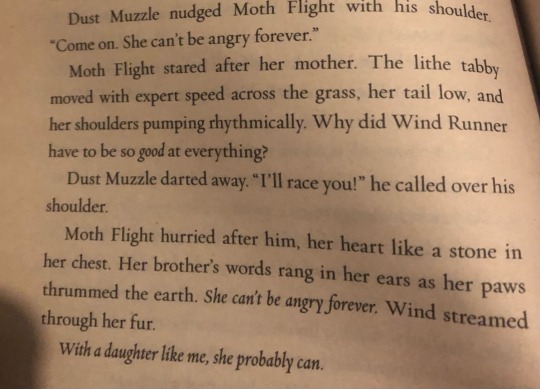
All this cumulates in an argument in which Wind Runner lists how irresponsible she believes Moth Flight to be tells Moth Flight she is a danger to her clan. And Moth Flight believes her, and runs away.
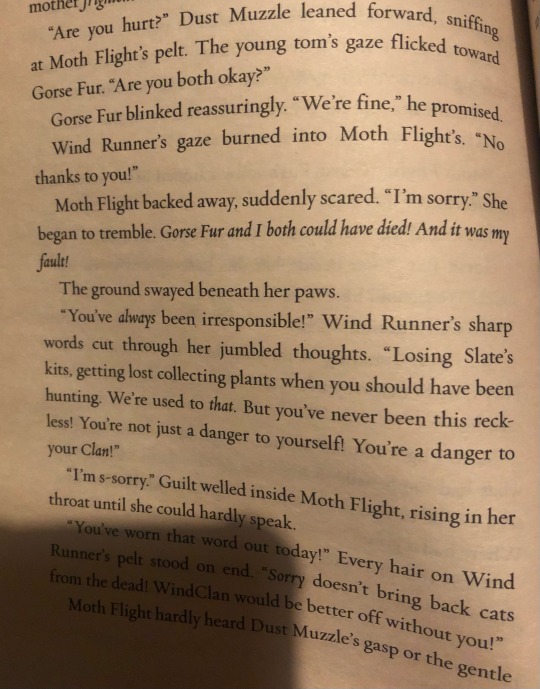
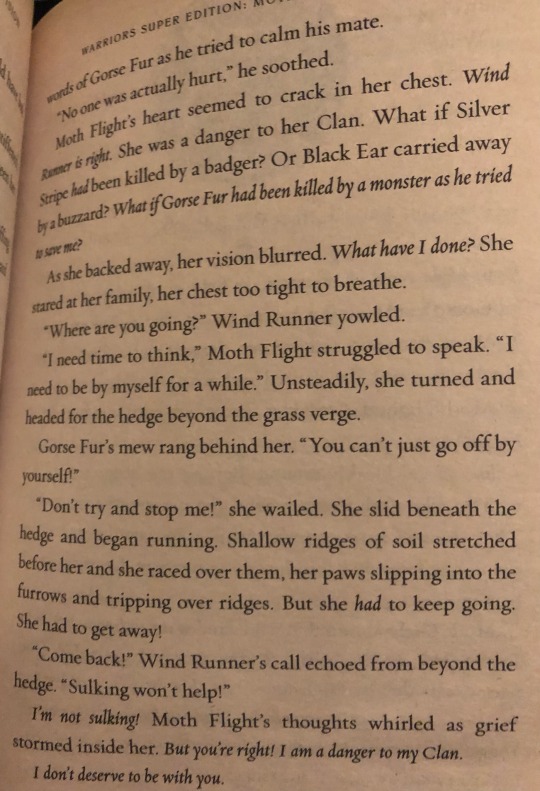
Now after this once Moth Flight returns as a medicine cat we don’t really get anything like this from Wind Runner again but the damage is done. Now here’s where the inference has to start coming in a bit. Who wouldn’t be left with a complex after this? Who wouldn’t be left with the need to prove themselves however they can? Moth Flight certainly sets out to please Wind Runner and prove she can be useful to her clan in the early part of the book when she’s receiving this abuse. So why would it just evaporate later when she actually finds something she’s good at and can be of great use to her clan doing? Just put a pin in that for a moment.
Also while we’re talking about Wind Runner; Moth Flight has a conversation with her dead siblings about how she wishes she could please Wind Runmer, which leads to her dead siblings saying that the reason Wind Runner is so harsh towards Moth Flight is because of the trauma she experienced when she lost her kits. Wind Runner’s trauma is ultimately what is causing her to inflict trauma onto Moth Flight.
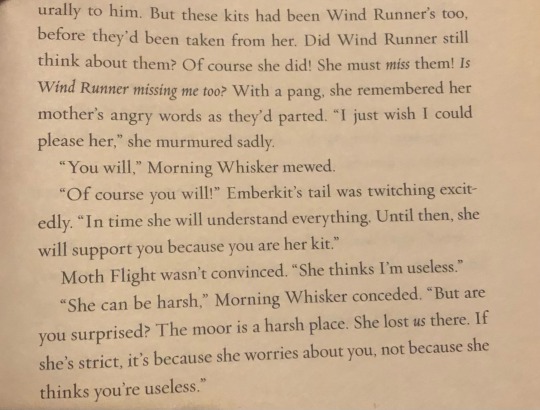
And now we move onto the second inflicter of trauma in Moth Flight’s life: Micah. Don’t worry, unlike Wind Runner, Micah didn’t inflict any trauma on Moth Flight through his own actions. Unless you count dying in a tragic accident right in front of Moth Flight. In which case yeah, his actions did inflict trauma on her. At least it was an accident.
Micah’s death deeply traumatises Moth Flight. She cannot bear to be in WindClan due to it, she lives in ShadowClan for a moon, avoiding going home due to her grief, and then only travels back once she realises she is pregnant, and decides she wants to be with kin.
The stage is set. The Erins have a young cat set up about to have four kittens that she’s going to give away and change the medicine cat code forever. What they do not realise is that the trauma they have influenced on this character can most definitely be inferred to have an effect on her actions surrounding her children from this point forward, ultimately being perceived as a large push as to why she gives them up.
The book wants us to believe that she gives up her kittens because it is just inherently impossible to be a medicine cat and have mates and children. Which isn’t true as cats such as Leafpool and Yellowfang have since proven wrong. And obviously there are the exceptional circumstances Moth Flight herself has been subjected to during this period. But her trauma can also be perceived to pay a huge part in her feeling like she cannot balance her duties and her children.
To start off with. The first moon of her kits life is fine. Moth Flight steps back from medicine cat duties and lets the very knowledgeable Reed Tail take primary healer duties for the clan. The book skips over the first moon with her kits and therefore we can assume nothing important happens, and no issues come from Moth Flight raising her kits for this first moon. Moth Flight does reflect that how she did on occasion try and do checkups but her kits always called her away. And here, while Moth Flight is reflecting on this, we get this paragraph:
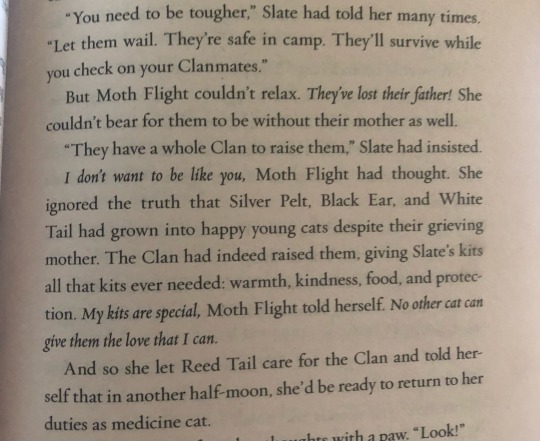
So here we learn two things:
She feels ready to stop having Reed Tail help her when her kits are a moon and a half (6 weeks) old.
Moth Flight does not want to let go of her kits for any amount of time. She equates Slate saying that she can leave the kits for short periods to them not having a mother figure in their lives. And she thinks her kits can only receive adequate love from her.
So with point 1, Moth Flight’s kittens are still little babies. And she feels that she should go back to being a full time medicine cat when they’re still that young despite having Reed Tail to hold the fort, and dismissing him as her helper entirely after this point. And here I’m going to bring back the idea of inference. I feel that this could stem from Wind Runner’s abuse at the start of the book. Wind Runner left her daughter feeling so compelled to be useful to her clan that she’s throwing herself back into her work far too early in order to keep her mother happy and be of use to the clan in the only way Moth Flight feels she can be. Is any of this written in the book? Hell no. But I feel that you can absolutely infer that Moth Flight’s drive to get back to work so soon is due to the lasting trauma and insecurities her mother had imposed on her.
Point 2 is a lot to unpack and here, and this is a point that comes up again, how Moth Flight feels compelled to take care of her kits personally rather than hand them off to babysitters due to their lack of a living father.
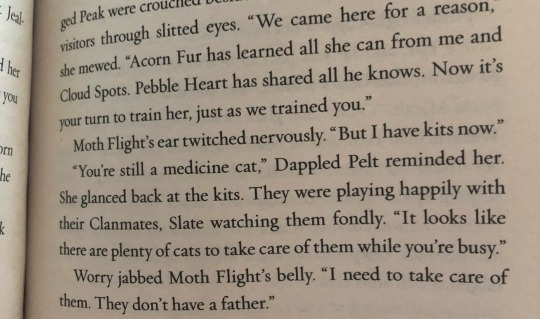
So if we use some of that inference here, we can infer that Micah’s death has left Moth Flight insecure about leaving her children alone. She feels that she is the only one who can properly take care of them in her clan. And, undoubtedly by accident, this idea comes back. There are two incidents with her leaving her kits to be babysat and irresponsible babysitting causes the kits to get hurt. The first is where she goes to a gathering and Rocky encourages three of the kits to climb a rock but tells the fourth she’s not ready. So the very next day she climbs the rock. She falls, she gets hurt. And not once does Moth Flight get angry at Rocky for encouraging her children to climb a big rock, oh no, she blames herself.
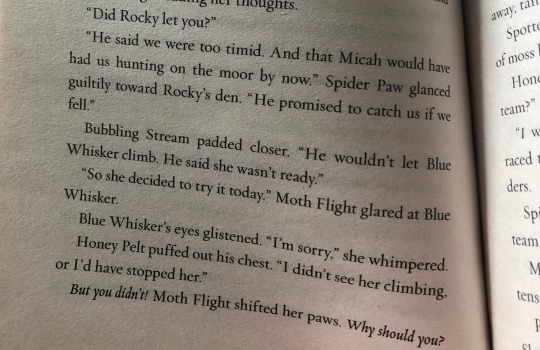

There isn’t one second where she thinks about how it’s Rocky’s fault this situation arose. She entirely blames herself for it, and the situation is never even discussed with Rocky.
And then something similar happens later on. Storm Pelt is supposed to be watching the kits while Moth Flight goes to RiverClan. And then all four kits end up following her and one of them falls in the river. She doesn’t blame Storm Pelt for any of this. She doesn’t have a single word of blame to say to him about him allowing all four of her children to follow her to RiverClan. And from that we can infer (even though again, the book doesn’t say) she feels the blame lies with herself. This inference can be strengthened given that this is the incident which causes her to feel she should give up her kits.
On top of her feeling wholly responsible for her kits at all times no matter who is looking after them, the main other way they distract her from her medicine cat duties is when she suddenly becomes paranoid that some horrible tragedy has befallen them while she isn’t watching them. And I think all of this paranoia and heightened sense of responsibility regarding her kits all comes down to Micah.
He died traumatically in front of her eyes. She feels extra protective of her children because they no longer have a father. And we can infer that her paranoia of them meeting a gruesome fate has come from her witnessing the painful death of her beloved Micah.
And where does this leave us? All this trauma stemming from both her mother and beloved? Well, Moth Flight decrees that medicine cats must not have mates or kits. She then inflicts trauma onto her own children by separating them and forcing them all to live apart. The trauma that Wind Runner and Moth Flight experienced can now be inferred to have trickled down to both Moth Flight’s kits, and many, many medicine cats for decades to come. The book wants you to believe this is because kits can distract from medicine cat duties, that they can pull a medicine cat away from important duties. But that only happens in Moth Flight’s Vision due to poor babysitters or mainly Moth Flight becoming paranoid that her kits are going to die horribly like their father once they’re out of her sight.
Is this all a stretch? Absolutely. I have no doubt this was absolutely not the intention of the Erins at all. But in the words of Todd Chavez:
Isn’t the point of art less what people put into it and more of what people get out of it?
And thats what I get out of Moth Flight’s Vision. A story about how tragic trauma can be, not only for an individual, but also for others if it becomes generational.
92 notes
·
View notes
Text
Yeah it sucks how some neurotypicals have watered down the term trigger, but the solution isn't to claim that only severely traumatized people have triggers. Most mental health issues can be triggered. If you have OCD and something makes your intrusive thoughts spike up, that was a trigger. If you are autistic and something makes your sensory issues flare up, that was a trigger. If you have depression and something makes you have suicidal thoughts, that was a trigger. If you have anxiety and something makes it worse, that was a trigger. It isn't just PTSD which can get triggered
2K notes
·
View notes
Note
ok so has anyone made a list of things that Astarion said that had a different meaning than first thought?
For example, if you tell Astarion when you first meet that you’re Baldurian as well, he says they must not be in the same social circle. With the way he talks and dresses it seems like he’s implying you’re lower class, but later it becomes clear you’re not those petty criminals or brothel goers that he targets. (And there’s the separate “of course it’ll turn me into a monster” line that becomes obvious later.)
He reveals he fears breaking his nail to the dryad, and it seems shallow but we learn he’s traumatized by digging himself out of his coffin, and the year he endured being trapped inside a coffin and desperately scratching and breaking his nails off as punishment, which is also why he refuses to dig anyone out like Nere.
Also, he mentioned he targeted brothel visitors, and at first it sounds like he just waited outside those establishments for victims, but then if you visit the drow twins he mentions he never thought he’d be on the paying end, plus if you choose one of the twins then Astarion says you have a type for elven prostitutes. And if you really think about it, considering how Petras’ lines are similar to Astarion’s, it wouldn’t be weird to imagine Cazador forcing them to work at a brothel for a few years as training…
Some of Astarion’s lines have a lot to unpack
Many things Astarion says are doublespeak. It's a common coping mechanism used by trauma survivors to "make peace," in a way with what they went through. It's not until you've played through his whole story that you understand that, and honestly it breaks my heart. He has a lot of self-depreciating language. Little quips here and there where you realize he's not only commenting on the current situation but himself, as well.
The monster line in the beginning gets me the most, because he follows it up with, "What did I expect?" For the first time in 200 years, he's able to stand in the sun without burning. He's grappling with that entire realization while also readjusting to there being light and color in the world, and probably was looking at the whole Nautiloid experience as something slightly positive... only to learn that no, this is not something positive. In fact, it's horrendous, because if it's not rectified, he'll become a grotesque monster, worse than he already is. And idk, that guts me. He has this small glimmer of hope for the first time in two centuries, all to realize that it's a giant farce.
But, Astarion is also stubborn, so he holds onto this small glimmer of hope to see if there's a way he can work the tadpole to his advantage. So that he can continue to walk in the sun. Once he realizes that Cazador's compulsion has been interrupted due to the tadpole, he doubles down on wanting to keep the tadpole and control it.
Astarion's story is such a beautiful portrayal of what being in survival mode feels and is like. You're so entirely desperate to make it out of your current situation that you would quite literally give anything and everything to obtain it, even if it means burning the entire world down around you.
The elven prostitute line made me laugh when I first heard it; I knew he was referring to himself and trying to make some light humor about his past, but it's also heartbreaking to realize he sees himself as one. He hasn't yet taken the grace with himself to distinguish between being forced into that line of work vs who he actually is. The lines are still blurred.
I can't think about the intricacies of his background/personality too long, because it all feels way too familiar to me. To know even a smidge of the despair he probably felt for years and the constant mental and physical struggle he endured (there's even disordered eating/food insecurity in his back story too and no one really talks much about it; Cazador purposely kept all the spawn near-starving as a form of control).
Our boy was severely abused and neglected and I really just want to give him a fucking hug.
#astarion#trauma tw#i mean i totally get why he burns down the palace post game#i probably would too#like how could you not want to do that#neech's speeches#answered
129 notes
·
View notes
Text
And I think it's perfectly valid to joke about your own mental health struggles if you want to. Like your own experiences and symptoms are fair game for jokes if you want them to be. I'm not telling you not to joke about mental illness or trauma or psych wards. But let's not make a mockery of OTHER people's trauma
151 notes
·
View notes
Text
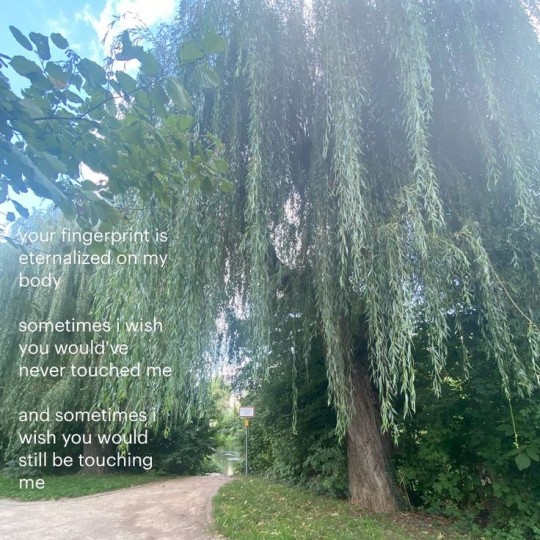


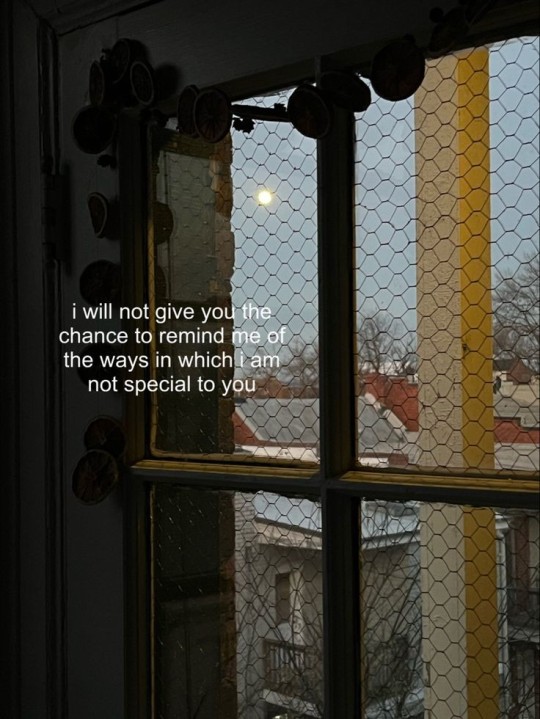
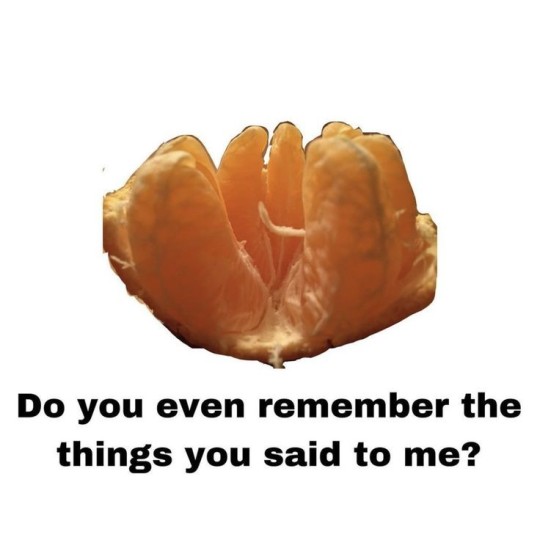

I hate what you've done to me!!!
...
So why do I still miss you?
#web weave#web weaving#webweaving#on grief#childhood trauma#trauma tw#on trauma#canine poetry#canine kin#childhood grief#familial love#trauma poetry#missing
253 notes
·
View notes
Text
reading supercut: disability, body image, and trauma
A glimpse into the clothes thrashing around in the washing machine of my mind, with apologies that it is still a wet lump and not an actual synthesis of ideas.
From Easy Beauty: A Memoir by Chloé Cooper Jones:
[This event] embedded a damaging idea in me, one I’d recognize deeply when I read Scarry years later: beauty was a matter of particulars aligning correctly. My body put me in a bracketed, undercredited sense of beauty. But if I could get the particulars lined up just right, I could be re-seen, discovered like the palm tree is discovered. To be deserving of the whole range of human desires, I had to be extraordinary in all other aspects.
In this new light, I started to see my work, my intellect, my skills, my moments of humor or goodness, not as valuable in themselves, but as ways of easing the impact of my ugliness. If only I could pile up enough good qualities, they could obscure my unacceptable body. [...] accepting the argument that beauty was malleable came, for me, with a cost. The Platonian view rejected me cleanly, but Hume and Scarry left a door ajar and I’ve spent a lifetime trying to contort my form to see if I could pass through it.
From Til We Have Faces: A Myth Retold by CS Lewis:
I now determined that I would go always veiled. I have kept this rule, within doors and without, ever since. It is a sort of treaty made with my ugliness. There had been a time in childhood when I didn't yet know I was ugly. Then there was a time (for in this book I must hide none of my shames or follies) when I believed, as girls do — and as Batta was always telling me — that I could make it more tolerable by this or that done to my clothes or my hair. Now, I chose to be veiled.
From Cognitive-Behavioral Therapy of Borderline Personality Disorder by Marsha Linehan:
Inhibited grieving is understandable among borderline patients. People can only stay with a very painful process or experience if they are confident that it will end some day, some time—that they can "work through it," so to speak. It is not uncommon to hear borderline patients say they feel that if they ever do cry, they will never stop Indeed, that is their common experience—the experience of not being able to control or modulate their own emotional experiences. [...] In the face of such helplessness and lack of control, inhibition and avoidance of cues associated with grieving are not only understandable, bur perhaps wise at times. Inhibition, however, has its costs. [...]
Volkan (1983) describes an interesting phenomenon, "established pathological mourning", which is similar to the pattern I am describing. In established pathological mourning, the individual wishes to complete mourning, but at the same time persistently attempts to undo the reality of the loss.
From How to Respond to Criticism by Danny Lavery:
Apologize, but don’t really mean it, and plant a seed of secret resentment so deep in your own heart that years later you can’t even remember that you’re the one who nurtured it and made it grow, it seems that much like a native part of you.
From Tiny Beautiful Things by Cheryl Strayed:
[After learning that state child protective services had made a budgetary decision to only intervene with children under 12, to one of the teenagers that regularly shared stories of abuse at home]
I told her it was not okay, that it was unacceptable, that it was illegal and that I would call and report this latest, horrible thing. But I did not tell her it would stop. I did not promise that anyone would intervene. I told her it would likely go on and she’d have to survive it. That she’d have to find a way within herself to not only escape the shit, but to transcend it [...] I told her that escaping the shit would be hard, but that if she wanted to not make her mother’s life her destiny, she had to be the one to make it happen. She had to do more than hold on. She had to reach. She had to want it more than she’d ever wanted anything. She had to grab like a drowning girl for every good thing that came her way and she had to swim like fuck away from every bad thing. She had to count the years and let them roll by, to grow up and then run as far as she could in the direction of her best and happiest dreams across the bridge that was built by her own desire to heal.
From Essays in Aesthetics by Jean-Paul Sartre:
Freedom is what you do with what's been done to you.
From "I Know What You Think of Me" by Tim Kreider:
if we want the rewards of being loved we have to submit to the mortifying ordeal of being known.
#mental health tw#trauma tw#child abuse tw#child neglect tw#staranise original#kinda#there's also a lot I've been reading about avoidant personality disorder that DEFINITELY needs a lot more baking#before it's ready to be unleashed onto the public
163 notes
·
View notes
Text
No cause, actually, when you really listen closely to the crumbs of Laszlo's backstory, none of the adult figures were very good to him at all.
He hardly remembers his mother. His father was dismissive of his passion for art, and his nanny was just. Weird.
He plays it off as though it was normal, but he obviously did not have a normal childhood at all and I hate that no one talks about it more often.
198 notes
·
View notes
Note
That ask you got made me realize that Blitzø and Stolas both show 4 of those 5 responses at various points, which I think is very interesting. I really never thought about it before but that's actually pretty impressive bc it never seems "out of character" for them. I think Blitzø leans more towards fight tho we see a lot of fawning from him too, and I think Stolas leans more towards fawn but I guess Blitzø really did make him feel braver bc he shows a lot of fight too.
Fight: Blitzø in FM ballroom + after Striker steals the phone from Stolas + both fighting with and saving Fizz in Oops // Stolas confronting Stella on his balcony + most of his interactions with Striker in WE + most of his scenes in Truth Seekers
Flight: Blitzø avoiding Stolas once things got complicated + not giving Fizz the love letter // Stolas in FM hallway + trying to escape Striker in the café
Fawn: Blitzø to the client in Murder Family + in FM bedroom + trying to talk to Loona in Seeing Stars about her people skills // Stolas when Blitzø comments on his Ozzie's outfit + to Stella in LLL + in a lot of his texts to Blitzø post-Ozzie's
Freeze: both freeze up in Ozzie's + potentially Stolas in the FM ballroom bc we don't see him move except to flinch until the very end but that might just be him forcing himself to stop running
Listing it out like that also made me realize that those two spend a good chunk of the series some degree of scared, nervous, or feeling unsafe. These poor guys 😭😭
Yeah, once you start to think about how present their trauma is in their lives, you can't help but notice that they're both extremely traumatised and broken people. It's really sad, and really well done, in my opinion.
I really like how complex they both are and how many different symptoms of trauma they show—both survival reactions like the ones listed here, and just their thoughts and fears and how they handle their relationships.
What's really interesting and compelling to me is how similar they are despite how different their lives have been. And how the more episodes come out, the more obvious this becomes.
Like, up until now, we knew that Stolas often fawned to keep the peace for fear of being a burden or making others uncomfortable, like he did in his text messages to Blitz, and in Ozzie's when he immediately agreed to leave when Blitz said so. And we knew that Blitz hated himself, that his biggest fear was dying alone, that he couldn't even bear to look at his own face in pictures.
And then, in The Full Moon, we get Blitz going into an extremely childish and heartbreaking fawn spiral with his "I can always do better", making himself smaller, smiling, wagging his tail. And we get Stolas covering every single picture (and item) in his house, and then taking the time to uncover Via so she's visible, but not himself. And we get Stolas terrified of dying alone.
And to me, this conveys really well how no one's trauma is worse than others', how no traumatised person is more or less broken or hurt than the rest, how there's no "lesser" trauma. How traumatised people can't be neatly divided into "people who become sensitive and weak" and "people who develop thick skin". How your trauma may present differently and uniquely depending on the circumstances, but deep down the truth is always that you were deeply hurt, and you can't bear to be hurt again, and your life has become a constant cycle of trying (and failing, due to self-fulfilled prophecies) to avoid going through that pain again.
Truly, masterfully done ❤️
#helluva boss#helluva boss the full moon#blitz helluva boss#helluva boss blitz#stolitz#stolas helluva boss#helluva boss stolas#Trauma tw
56 notes
·
View notes